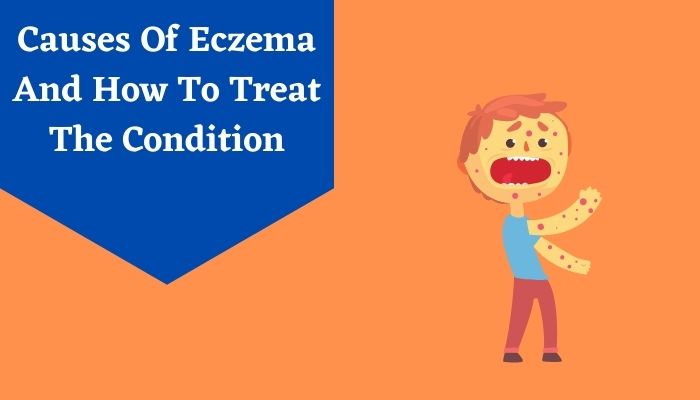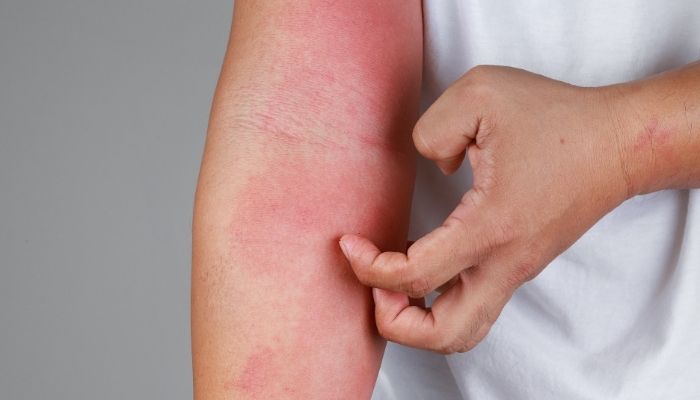Skin is the largest sense organ in the human body and the most prone to diseases like eczema or atopic dermatitis. So, what is eczema? Eczema is a common skin disorder, wherein a person feels uncomfortable due to itchy, dry, and red skin. Eczema is also known as Atopic Dermatitis, wherein, ‘Atopic’ means allergies, and ‘Dermatitis’ means skin. In short, it is a skin condition resulting from allergies to the skin. Symptoms of eczema may vary from person to person, and it usually starts with a mild rash leading to severe itching and red patches on the affected area of the skin.
Finding a proper treatment for eczema or atopic dermatitis will be possible only if you know all about the eczema causes. So, let us talk about the various atopic dermatitis symptoms along with the different atopic dermatitis causes and how to treat the condition and prevent it from going worst.
Types of Eczema
Eczema is one of the most common skin diseases all across the globe. One out of 5 people is suffering from eczema. Sadly, children are more prone to this disease because of poor hygiene, but even adults are the common sufferers of eczema.There are seven different types of eczema and they are:
- Atopic Dermatitis
- Contact Dermatitis
- Hand Eczema
- Neurodermatitis
- Dyshidrotic Eczema
- Nummular Eczema
- Stasis Dermatitis
Common Eczema Causes
Here are some common atopic dermatitis causes for your understanding of this skin disorder:1. Immunity Levels: The biggest cause of eczema found in various studies is a low immune system. Atopic as we just mentioned ago means allergies, so this disease is caused due to allergens and things to which our body is allergic. As a result of the allergies, our skin feels inflammation and starts showing symptoms of eczema.
2. Role of your Genetics: Second major cause of eczema is our family genetics of dermatitis. In other words, this is one skin disease that can pass from generation to generation due to genetics. If your parents suffered from eczema, chances are high that you too will suffer from it and will be allergic to the same allergens.
3. Stress Levels: Stress has the power to worsen any health condition and the same is true in the case of eczema too. Higher stress levels may cause eczema or worsen the condition further. You need to keep your stress levels under check to keep eczema at bay.
4. Role of Environment: Most of the allergens to which our immune system reacts are found in the environment, so the environment plays an important role in causing eczema. Some people experience atopic dermatitis symptoms due to smoke or air pollutants, while some are allergic to pollen and dry air. So, the environment undoubtedly is one of the big eczema causes.
Common Symptoms of Eczema
Let us now unfold the most common Atopic Dermatitis symptoms for your understanding:- Dry Patchy Skin
- Itchy Skin
- Red Skin with Rashes
- Swelling on Skin
- Crusting Skin
- Skin with Bumps
- Scaly and Flaky Skin
Treatment Options for Eczema
Once you can diagnose the right cause of eczema, you can get proper treatment for the condition. The ultimate goal of any treatment for eczema would be to relieve you from itching and discomfort while preventing further skin infection and frequent skin flare-ups.Some of the common treatment options for eczema are:
1. Moisturization: The best remedy to cure eczema is by keeping your skin hydrated with a good moisturizer. Try to use a mix of moisturizer and cream to keep your skin hydrated all day long.
Also Read: Best Ways to Use Aloe Vera Gel for the Face for Better Results
2. Skin-Friendly Skin Products: Secondly, since eczema is a skin disease, try to use mild soaps and other skin-friendly products on your skin. Avoid using perfumed soaps and alcohol-rich toiletries.
3. Over-The-Counter Antihistamines: You may experience some instant relief by taking over-the-counter antihistamines easily available from any pharmacist store.
4. Prescription Medications: If you are experiencing severe atopic dermatitis symptoms, then your dermatologist will prescribe you some steroid shots, pills, or creams. You may also be prescribed TIMs or Topical Immunomodulators to treat your severe eczema symptoms.
5. Ointments and Cortisone Creams: Besides, the prescribed medicines to treat eczema, you may try to cure the disease with cortisone ointments and creams. These will help reduce the skin itching and redness to a great extent.
6. Phototherapy: An alternative treatment for eczema is phototherapy. In this treatment option, ultraviolet light waves using special lamps are used to get relief from eczema symptoms.
Preventing Eczema
As it is always said that prevention is better than cure, one should try to prevent eczema.Following are some of the preventive measures to keep this skin disease called eczema or atopic dermatitis at bay:
- Keep your skin hydrated and moisturized to avoid symptoms of eczema.
- Use warm water for a bath instead of hot water.
- Do not overuse the soap and try to use herbal or mild soaps.
- Don’t rub your skin with a towel vigorously after a bath, instead do gentle pressing and patting.
- Try to wear pure cotton clothes instead of synthetic clothes.
- Avoid scratching your skin in case of itching.
- Avoid going outdoors in extreme sunlight, heat, or cold.
- Try to avoid food that may cause food allergies and as a result eczema to your skin.
- Make sure to keep your body hydrated by drinking 8 to 10 glasses of water.
- Avoid going in and out of the house in extreme changes of temperature.
The Bottom Line
Now, that you are aware of the main causes of eczema and how to treat the condition, we assume you won’t take it lightly. Remember, preventing this skin condition is an ideal way to get rid of it in the first place. Try to maintain hygiene and if you detect early signs of eczema, visit a dermatologist for a check-up without much delay.




